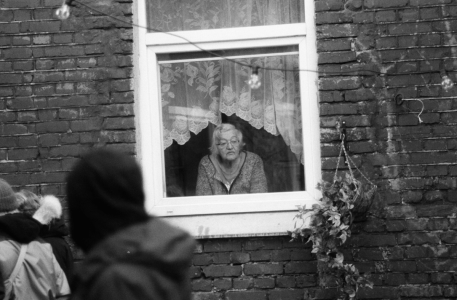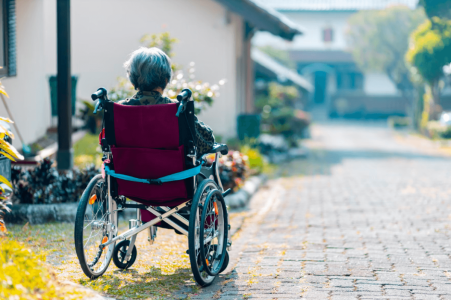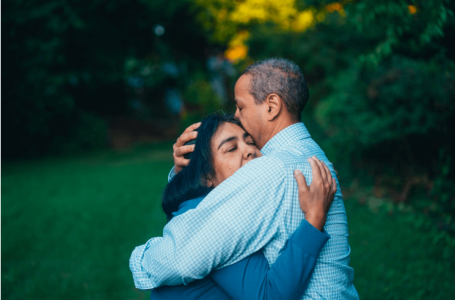The Tragic Toll of Dementia: Self-Harm a Concerning Risk for Patients
- Replies 12
Dementia - a diagnosis that strikes fear in the hearts of those who receive it. Not only does this cruel disease rob people of their memories, but recent research has revealed a distressing link between dementia and self-harm. It's like being caught in the middle of a storm with no shelter in sight.
This alarming discovery highlights the pressing need for more support and understanding for people living with dementia and their loved ones. It's a call to action that cannot be ignored.
One person who knows all too well the devastating effects of dementia is Stephen Grady, a brilliant scientist and leader in his field. When he was diagnosed with dementia at just 60 years old, he felt like his worth had been suddenly stripped away. 'It was like I went from being a valuable member of society to being worthless,' he shared.
Stephen's story is one that many can relate to, as the diagnosis of dementia can leave people feeling hopeless and asking themselves, 'Is life still worth living?' It's a heartbreaking question that deserves a compassionate and empathetic response.

A recent study conducted at the University of New South Wales has shed new light on the devastating impact of dementia on patients and their families.
The study found that dementia patients are at a higher risk of self-harm within the first year of diagnosis, adding to the already enormous challenges faced by both patients and caregivers.
Dr Adrian Walker, the lead author of the study, described dementia as a 'perfect storm' of factors contributing to self-destructive behaviour. The research team analysed data from over 180,000 people admitted to hospitals in New South Wales between 2001 and 2015, including those diagnosed with dementia and those admitted for self-harm injuries.
The results of the study were alarming. Of the 154,811 people recorded with dementia, 692 were readmitted to the hospital for self-harm within 12 months of their first dementia visit. These findings highlight the urgent need for increased support and resources for both patients and caregivers during this challenging time.
For families who suddenly find themselves caring for a loved one with dementia, the burden can be overwhelming. The emotional toll of watching a loved one struggle with memory loss and confusion, coupled with the added stress of providing round-the-clock care, can be devastating.
The study has also raised some difficult questions regarding the complex relationship between the two. While the research suggests a strong connection between the two, the possibility of one directly causing the other remains unclear.
According to Dr Walker, it's possible that both factors are linked, but there may be other contributing factors that require further investigation.
The researchers also found that younger patients diagnosed with dementia were more likely to engage in self-harm than those who were diagnosed at an older age. Additionally, patients with complex psychiatric profiles were at a higher risk of hospitalisation for self-harm.

In Australia alone, there are currently over 400,000 individuals living with dementia, and this number is expected to rise to over 800,000 by 2058.
Dementia is already the leading cause of death for women and the second leading cause of death for all Australians, making it a significant public health concern.
Although there are challenges in interpreting the data due to the lack of reliable information and confusion between self-harm and accidents, Associate Professor Simone Reppermund from the University of New South Wales emphasised that self-harm could be a result of the diagnosis.
Individuals with dementia may feel helpless, lonely, and devoid of purpose, leading to a sense of hopelessness and a higher risk of self-harm.
The findings of this research have been published in Alzheimer's and Dementia: The Journal of the Alzheimer's Association, serving as an essential call to action for increased support, understanding, and prevention measures for those affected by dementia.

As we look towards the future, it's clear that there is much work to be done — such as more research, treatment, and resources to better support people living with dementia and their families, who are often thrust into the role of caregivers with little warning or preparation.
We also need to work towards creating more dementia-friendly communities, where people with dementia can live with autonomy, purpose, and dignity.
What are your thoughts on this important issue? Have you or someone you know been affected by dementia? What steps do you think we can take to better support individuals living with dementia and their families? Share your thoughts and experiences in the comments below.

At Senior's Discount Club, we understand that mental illness can be a challenging and isolating experience. We want you to know that you're not alone and that there is always help available when you need it.
If you or someone you know is in crisis and needs immediate assistance, please call triple zero (000) or Lifeline on 13 11 14. Lifeline is available 24 hours a day, seven days a week, and their trained counsellors can offer support and guidance during times of crisis.
Although we are not medical professionals, we are always here to listen and provide a compassionate ear. Additionally, several organisations throughout Australia provide specialised support and education for people with mental illness and their families and carers.
We understand that seeking help can be challenging, but these organisations are here to help you through your journey. We've compiled a list of some of them here in this article, so please don't hesitate to reach out for support when you need it.
This alarming discovery highlights the pressing need for more support and understanding for people living with dementia and their loved ones. It's a call to action that cannot be ignored.
One person who knows all too well the devastating effects of dementia is Stephen Grady, a brilliant scientist and leader in his field. When he was diagnosed with dementia at just 60 years old, he felt like his worth had been suddenly stripped away. 'It was like I went from being a valuable member of society to being worthless,' he shared.
Stephen's story is one that many can relate to, as the diagnosis of dementia can leave people feeling hopeless and asking themselves, 'Is life still worth living?' It's a heartbreaking question that deserves a compassionate and empathetic response.

Research has found that dementia patients are more likely to self-harm within the first year of diagnosis. Credit: Unsplash/Kaspars Eglitis.
A recent study conducted at the University of New South Wales has shed new light on the devastating impact of dementia on patients and their families.
The study found that dementia patients are at a higher risk of self-harm within the first year of diagnosis, adding to the already enormous challenges faced by both patients and caregivers.
Dr Adrian Walker, the lead author of the study, described dementia as a 'perfect storm' of factors contributing to self-destructive behaviour. The research team analysed data from over 180,000 people admitted to hospitals in New South Wales between 2001 and 2015, including those diagnosed with dementia and those admitted for self-harm injuries.
The results of the study were alarming. Of the 154,811 people recorded with dementia, 692 were readmitted to the hospital for self-harm within 12 months of their first dementia visit. These findings highlight the urgent need for increased support and resources for both patients and caregivers during this challenging time.
For families who suddenly find themselves caring for a loved one with dementia, the burden can be overwhelming. The emotional toll of watching a loved one struggle with memory loss and confusion, coupled with the added stress of providing round-the-clock care, can be devastating.
The study has also raised some difficult questions regarding the complex relationship between the two. While the research suggests a strong connection between the two, the possibility of one directly causing the other remains unclear.
According to Dr Walker, it's possible that both factors are linked, but there may be other contributing factors that require further investigation.
The researchers also found that younger patients diagnosed with dementia were more likely to engage in self-harm than those who were diagnosed at an older age. Additionally, patients with complex psychiatric profiles were at a higher risk of hospitalisation for self-harm.

The research brings attention to the urgent need for increased understanding and support for those living with dementia and their families. Credit: Unsplash/Steven HWG.
In Australia alone, there are currently over 400,000 individuals living with dementia, and this number is expected to rise to over 800,000 by 2058.
Dementia is already the leading cause of death for women and the second leading cause of death for all Australians, making it a significant public health concern.
Although there are challenges in interpreting the data due to the lack of reliable information and confusion between self-harm and accidents, Associate Professor Simone Reppermund from the University of New South Wales emphasised that self-harm could be a result of the diagnosis.
Individuals with dementia may feel helpless, lonely, and devoid of purpose, leading to a sense of hopelessness and a higher risk of self-harm.
The findings of this research have been published in Alzheimer's and Dementia: The Journal of the Alzheimer's Association, serving as an essential call to action for increased support, understanding, and prevention measures for those affected by dementia.
Key Takeaways
- A recent study conducted by the University of New South Wales has found a strong link between dementia and self-harm in the first year after diagnosis.
- The research revealed that of the 154,811 people recorded with dementia in the study, 692 were readmitted to the hospital for self-harm within 12 months of their first dementia visit.
- The findings underscore the urgent need for increased support, understanding, and prevention measures for those affected by dementia.
As we look towards the future, it's clear that there is much work to be done — such as more research, treatment, and resources to better support people living with dementia and their families, who are often thrust into the role of caregivers with little warning or preparation.
We also need to work towards creating more dementia-friendly communities, where people with dementia can live with autonomy, purpose, and dignity.
What are your thoughts on this important issue? Have you or someone you know been affected by dementia? What steps do you think we can take to better support individuals living with dementia and their families? Share your thoughts and experiences in the comments below.

By working together to raise awareness and provide support, we can ensure that those living with dementia and their loved ones receive the care and compassion they need. Credit: Unsplash/Gus Moretta.
At Senior's Discount Club, we understand that mental illness can be a challenging and isolating experience. We want you to know that you're not alone and that there is always help available when you need it.
If you or someone you know is in crisis and needs immediate assistance, please call triple zero (000) or Lifeline on 13 11 14. Lifeline is available 24 hours a day, seven days a week, and their trained counsellors can offer support and guidance during times of crisis.
Although we are not medical professionals, we are always here to listen and provide a compassionate ear. Additionally, several organisations throughout Australia provide specialised support and education for people with mental illness and their families and carers.
We understand that seeking help can be challenging, but these organisations are here to help you through your journey. We've compiled a list of some of them here in this article, so please don't hesitate to reach out for support when you need it.








